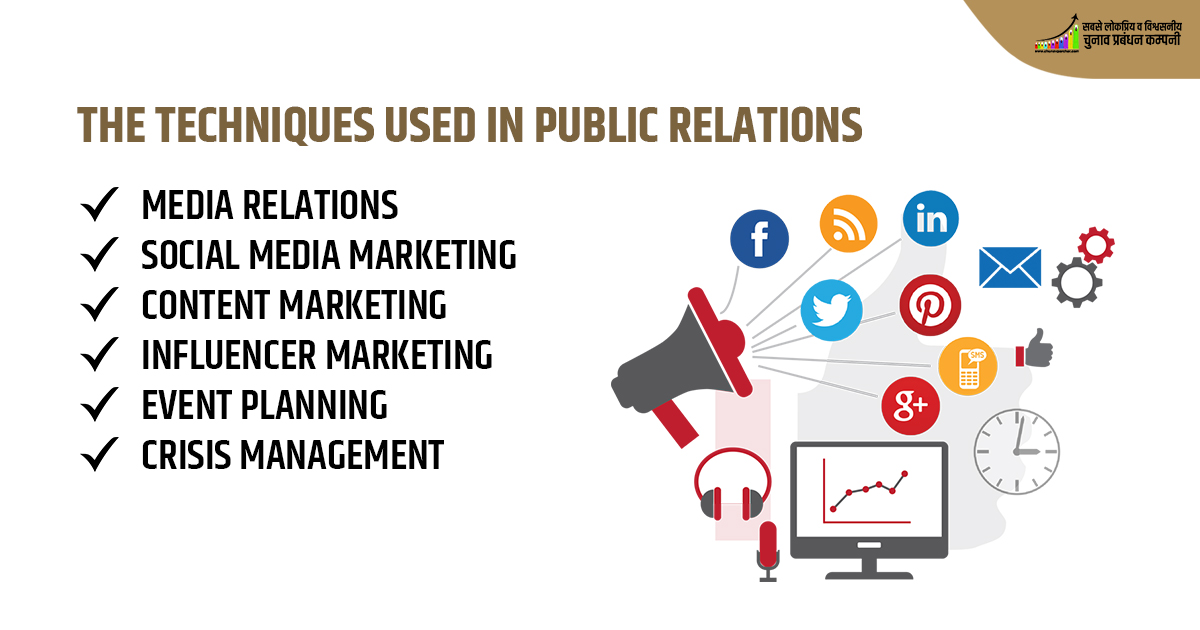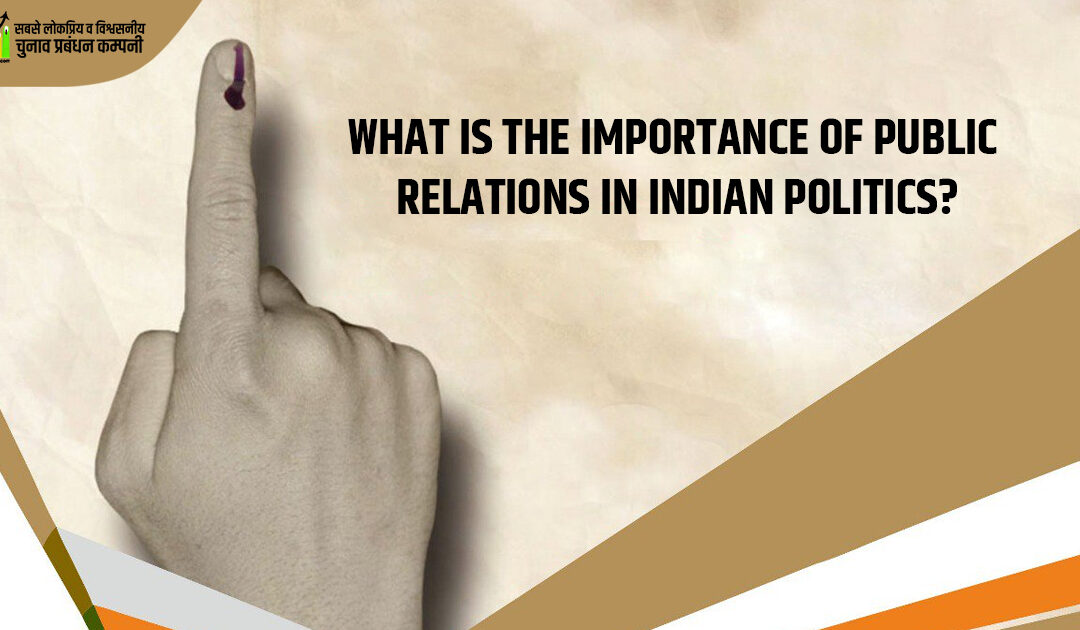Introduction
In Indian politics, public relations (PR) play a crucial role in shaping public opinion, building a political image, and establishing trust and credibility with voters. In a country as diverse and complex as India, where political parties must appeal to a wide range of social, cultural, and economic groups, effective PR strategies can make all the difference in winning elections and governing successfully.
Political parties and leaders must leverage PR tools and techniques to effectively communicate their vision, policies, and achievements to the masses. From organizing public rallies and events to crafting a social media strategy, PR can help politicians connect with their constituents and build a positive image in their minds.
The Role of Public Relations in Politics
Public relations plays an important role in politics by helping political leaders and parties to communicate effectively with the public and build support for their ideas and policies.
One of the key functions of public relations in politics is to shape public opinion and perception. This can be done through various strategies such as media relations, advertising, events, and social media. Political leaders and parties can use these tactics to control the narrative and ensure that their messages are being received positively by the public.
Another important function of public relations in politics is crisis management. In the event of a crisis or scandal, public relations professionals can help political leaders to address the situation, manage the fallout, and repair any damage to their reputation. This involves developing a strategic response plan, communicating with the media and the public, and monitoring the situation closely to ensure that the message is being received as intended.
Public relations also plays a key role in political campaigning. Political parties and candidates rely on public relations professionals to develop and execute effective campaign strategies, including messaging, media relations, and events. These strategies are designed to reach and persuade voters, build support, and ultimately win elections.
The Need for Public Relations in India
Public Relations (PR) is an essential function for any organization, including those in India. It involves managing communication and relationships between an organization and its stakeholders, including the media, customers, employees, shareholders, and the general public. The need for public relations in India is significant, and companies like Chunav Parchar can benefit greatly from investing in PR.
Here are some reasons why public relations is crucial for companies in India:
- Building and Maintaining a Positive Reputation: Public relations helps companies build a positive reputation among their stakeholders. In today’s competitive market, it is essential for companies to have a good reputation to attract customers and investors.
- Crisis Management: In the event of a crisis or negative publicity, PR professionals can help companies manage the situation effectively. They can control the narrative and provide timely and accurate information to the public, which can help minimize the damage to the company’s reputation.
- Media Relations: PR professionals can help companies build relationships with journalists and media outlets. This can lead to positive coverage of the company’s products and services, which can help increase brand awareness and sales.
- Employee Relations: PR professionals can help companies communicate effectively with their employees. This can include internal communication strategies, such as newsletters, email updates, and employee events, which can help improve employee morale and loyalty.
- Government Relations: PR professionals can also help companies build relationships with government officials and policymakers. This can be especially important for companies operating in regulated industries or those seeking government contracts.
The Objectives of Public Relations in Politics
Public relations (PR) in politics is a vital aspect of political communication that involves managing and enhancing the image and reputation of politicians, political parties, and government institutions. The following are some of the objectives of public relations in politics:
- Building and Maintaining a Positive Image: The primary objective of PR in politics is to create and maintain a positive public image of political leaders and institutions. This involves crafting messages and communication strategies that project politicians and political parties as trustworthy, competent, and committed to serving the public interest.
- Managing Public Opinion: PR in politics is also about influencing public opinion on political issues, policies, and decisions. This involves using different communication channels to convey the government’s position on various issues and to persuade the public to support their policies.
- Responding to Crises: PR in politics is also essential in managing crises and negative publicity. Political PR teams must be prepared to respond promptly to crises and develop strategies to minimize damage to the reputation of politicians and political parties.
- Developing Relationships with the Media: Public relations in politics also involves building strong relationships with journalists and the media. This is important for ensuring that politicians and political parties have a platform to communicate their messages to the public.
- Mobilizing Public Support: Finally, PR in politics aims to mobilize public support for political campaigns, rallies, and other political events. This involves using various communication strategies to engage with the public and motivate them to participate in political activities.
The Techniques Used in Public Relations

Public relations is a critical component of any business’s marketing strategy. It involves building and maintaining relationships between a company and its target audience, with the goal of promoting the company’s brand, products, or services.
There are several techniques used in public relations that can help your company, Chunav Parchar, effectively communicate with its audience and achieve its goals:
- Media Relations: This technique involves building relationships with journalists and media outlets to secure coverage of your company’s news, events, and products.
- Social Media Marketing: Social media is a powerful tool for reaching a wide audience and promoting your company’s message. By leveraging social media platforms such as Twitter, Facebook, and Instagram, you can build a strong online presence and engage with your followers.
- Content Marketing: Content marketing involves creating high-quality, informative content that is designed to engage and educate your audience. This can include blog posts, videos, infographics, and other types of content that provide value to your audience.
- Influencer Marketing: This technique involves partnering with influencers who have a large following on social media or other platforms. By working with influencers, you can reach a wider audience and increase your company’s visibility.
- Event Planning: Hosting events such as product launches, press conferences, or networking events can be an effective way to generate buzz around your company and connect with your target audience.
- Crisis Management: In the event of a crisis or negative publicity, it’s important to have a plan in place to manage the situation effectively. This can involve issuing statements, responding to media inquiries, and taking steps to address the issue at hand.
The Impact of Public Relations in Indian Politics
Public relations plays a significant role in Indian politics, and as a company named Chunav Parchar, you have an important role to play in shaping the political landscape in the country. Here are some ways in which public relations can impact Indian politics:
- Image Building: Public relations can help political parties and candidates build a positive image among the public. Through various communication channels such as press releases, social media, and events, political parties can communicate their ideologies, achievements, and plans to the masses.
- Crisis Management: Public relations can help political parties and candidates manage crises that may arise during an election campaign. A well-planned PR strategy can help them respond quickly to any negative publicity, and minimize the damage to their image.
- Voter Engagement: Public relations can help political parties and candidates engage with voters and create a two-way communication channel. By using social media platforms, they can connect with voters, understand their concerns, and address them through their campaign promises.
- Media Relations: Public relations can help political parties and candidates build relationships with the media. A positive relationship with the media can help them gain favorable coverage and increase their visibility.
- Perception Management: Public relations can help political parties and candidates manage the perception of their opponents. By highlighting their own strengths and the weaknesses of their opponents, they can influence public opinion and gain an advantage.
Conclusion
One of the main benefits of effective PR in Indian politics is that it can help build trust and credibility among voters. By communicating transparently and effectively with the public, political parties can create a positive perception of themselves and their policies. This can help them to win the trust of the public and gain their support, which is crucial for success in elections.
Another important role of PR in Indian politics is to manage crises and controversies. In a highly polarized political environment, it is common for political parties and leaders to face criticism and negative publicity. Effective PR can help to mitigate the damage caused by negative publicity and to present a positive image to the public.

